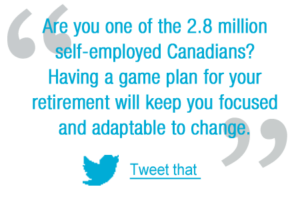By Karin Mizgala, Co-Founder and CEO Money Coaches Canada

More Canadians than ever before are choosing self-employment. According to Statistics Canada, the current number is 2.8 million. Many more—maybe you—hope to start a business in the coming years.
It’s not surprising; being self-employed allows you a certain level of self-determination that is often lacking when you are an employee. But greater freedom also comes with greater responsibility, especially around money management.
Not only must you manage cash flow to sustain the business and yourself, you are also fully responsible for funding your retirement. In traditional employment, employees often have access to a pension, or retirement contribution matching program; not so for the self-employed.
But if you’re self-employed, you shouldn’t look at this as a drawback, like everything about self-employment; retirement planning is just another area where you can be empowered to succeed. In fact, in a world where defined benefit plans in the private sector are becoming rare, even traditionally employed individuals would do well to think like the self-employed in this area.
Having a game plan for your retirement, will keep you focused and adaptable to change. At least 10 years out from your projected retirement date you should be addressing any financial shortfalls, and preparing yourself mentally for the lifestyle shift.
The basics of your game plan are clear goals, managing your money, making the most of government benefits, and surrounding yourself with expert advice and support. Let’s look at them one at a time.
What Does Your Retirement Look Like?
How much money will you need to retire? The answer to that lies in your vision of retirement. Consider the following:
- Do you already have a retirement age in mind? Do you intend to retire in one fell swoop—working one day, retired the next—or do you intend to transition slowly?
- Will you stay in your current home or downsize?
- Will you travel frequently or are you more of a homebody?
- What activities do you want to be able to continue—or begin (skiing, golf, gardening, gym membership, painting, etc..).
- Do you intend to do part-time work or consult in the early years of retirement?
- Will you have dependents when you retire? (A disabled child, a partner or spouse in ill health). Depending how far you are from retirement, it is difficult to predict the future, but it’s worth contemplating.
- Do you want to be able to contribute to causes or organizations?
- Do you want to leave a financial legacy? How much and to whom?
- Do you expect to be sharing expenses with a partner? If that situation were to change what would the financial impact be?
- Do you stand to inherit wealth by the time you retire?
Once you have an idea of what you would like your retirement to look like, you can establish how much money you will need to fund it. If you find establishing that number difficult on your own, you may want to consult a Money Coach.
Tomorrow Walks Today
Retirement often feels far away. And when the expenses of daily life are more than enough to deal with, retirement savings may feel like a luxury you can’t afford just yet. But that’s a big mistake. You want to start investing your money in RSPs and TFSAs as early as possible.
There is an expression—tomorrow walks today. It means that the things you do (or don’t do) today have a real impact on tomorrow. You won’t have the financial future you want, if you don’t behave with that future in mind in the present. Managing your personal and business cash flow is a big part of that.
Do you know where your money is going each month? Personally and in your business? If you don’t, start tracking your expenses. You can’t make new choices, until you are aware of your current ones.
Here are some ways to stay on top of your business cash flow:
- Stay engaged. Online accounting software makes it very simple to reconcile your accounts and generate reports. Hire a bookkeeper to input the numbers and focus your energies on reviewing and making decisions based on the reports.
- Cut costs. Are you paying for subscriptions or memberships you don’t really need? Can you find better deals for your internet and mobile costs? Are you paying too much for your insurance? Look especially at any expense that you haven’t reviewed in a while. Your needs may have changed.
- Convert assets to cash. Depending on the nature of your business you may have excess inventory you can discount for a quick sale. You may even have equipment you no longer use, that could be turned into cash.
- Get paid. Sounds obvious, but sometimes an entrepreneur is so passionate about the work, that they lose track of invoicing (this can be especially true for solopreneurs).
- Get paid up-front. If you work on long term projects, make sure you get paid a percentage before you begin; a percentage half way; and the balance at completion.
When you are in control of your money, you can make retirement savings part of the plan, not an afterthought.
Government Benefits? Nothing to Sneeze at!
While it’s essential that you create retirement savings of your own, don’t discount the impact of your government benefits. Old Age Security (OAS) and Canada Pension Plan (CPP) could be enough to cover your basic needs if you qualify for the maximum benefits. OAS is based on residency and CPP is based on what you have contributed over the years.
For the employed, contributions to CPP are made through salary deductions. The employee pays half and the employer pays half. As a self-employed Canadian you are both employee and employer, so you are responsible for the entire contribution. It can seem like a big chunk of your money is going to CPP, but forced savings can be a good thing when there are so many competing demands on your money.
 CPP has begun a series of contribution enhancements (modest increases over seven years) that will ultimately increase the maximum CPP retirement pension benefit by about 50%. Unfortunately if you are fairly close to retirement you won’t reap much, if any, benefits from the increase.
CPP has begun a series of contribution enhancements (modest increases over seven years) that will ultimately increase the maximum CPP retirement pension benefit by about 50%. Unfortunately if you are fairly close to retirement you won’t reap much, if any, benefits from the increase.
Starting January 1, 2019 the required CPP contribution rose from 9.9% to 10.2% of your pensionable earnings. As a self-employed person you will have to shoulder the increases yourself. If you have trouble calculating your contribution, most tax software will handle that function for you. By setting up a My Account page on the Canada Revenue Agency website you can view your current benefit standings.
Surround Yourself with Expert Advisors
If you are going to be master of your own ship you need a crew. Even though the term solopreneur has popped-up over the last few years, no one truly runs a business alone. The most successful among the self-employed know where their strengths lie and where they need assistance.
If your expertise is not in finance, then you will want to hire that expertise. Most small business owners do have a lawyer, an accountant and financial advisor, that they consult as needed. But I would suggest that you make reviewing your finances and retirement plans a regular habit. A Money Coach can be a great support in this area.
It may seem that your income or goals haven’t changed much from year to year, so you just meander along with the strategy you’ve established. The thing is; government tax policies, banking regulations, Canada Pension Plan (CPP) and Old Age Security (OAS) are all subject to changes that could significantly impact your plans. It would be wise to stay up-to-date.
Empower Yourself
The transition to retirement is a big one. But retirement planning shouldn’t be a chore or something to fear.
As an entrepreneur you understand that your income isn’t stifled by wage caps or glass ceilings, you can be as innovative as you want, and aim for success on your terms. The terms of your retirement are also under your control.
Bringing the same passion for growing your business to cultivating your retirement plans is empowering. And having a Money Coach as an ally can bring you a lot of peace-of-mind.


